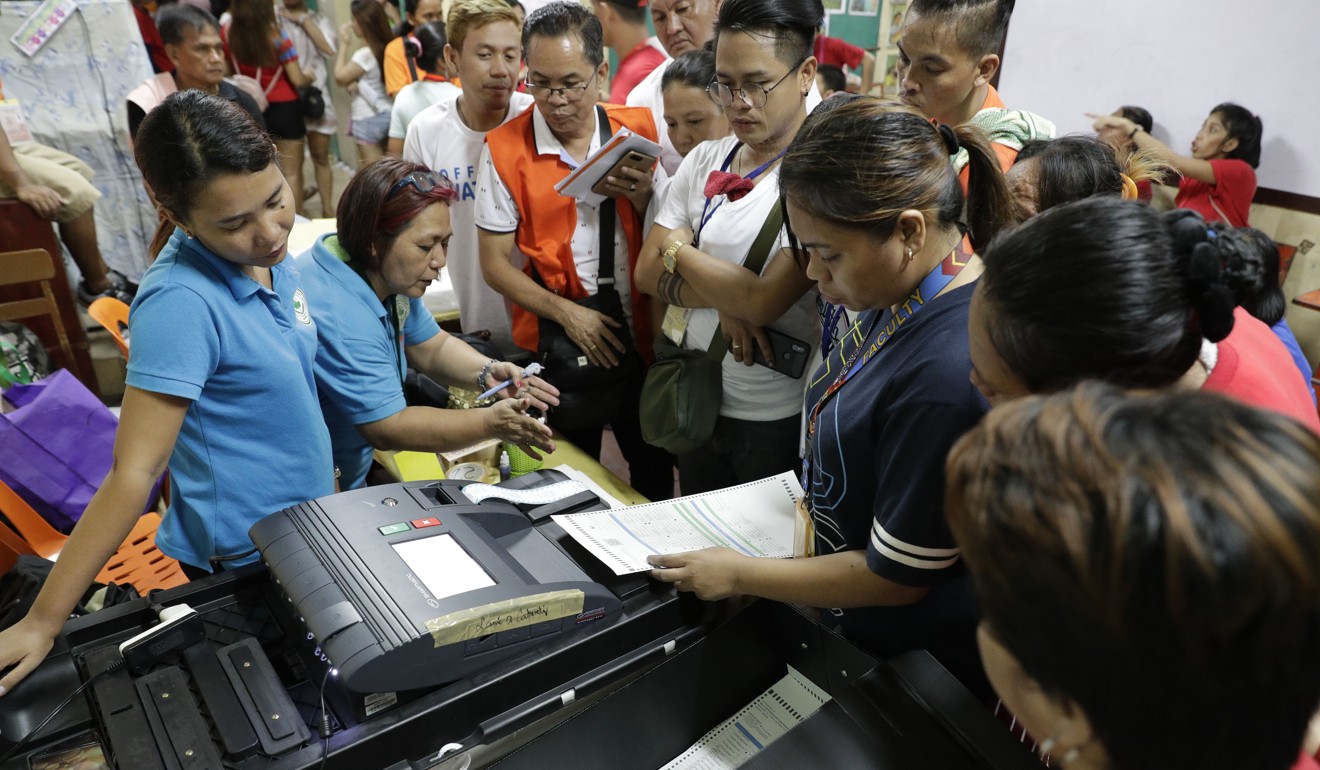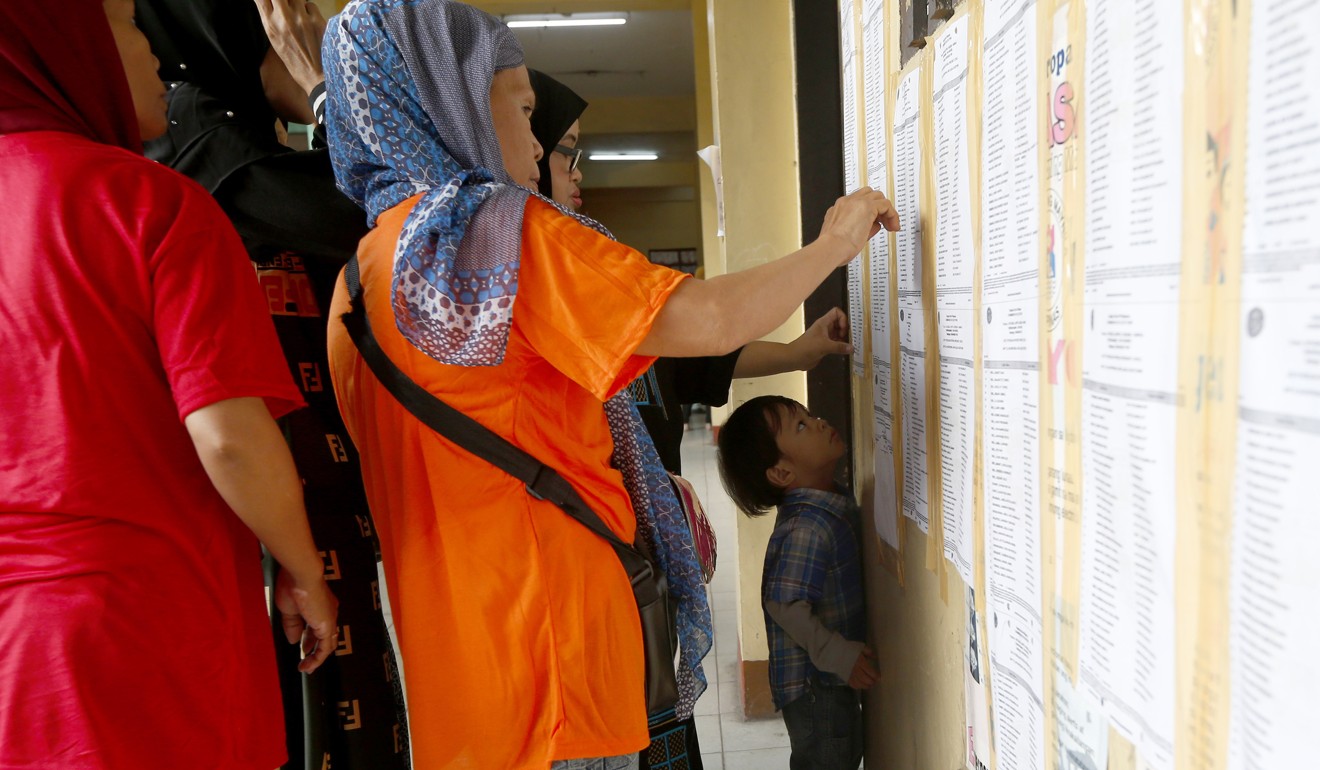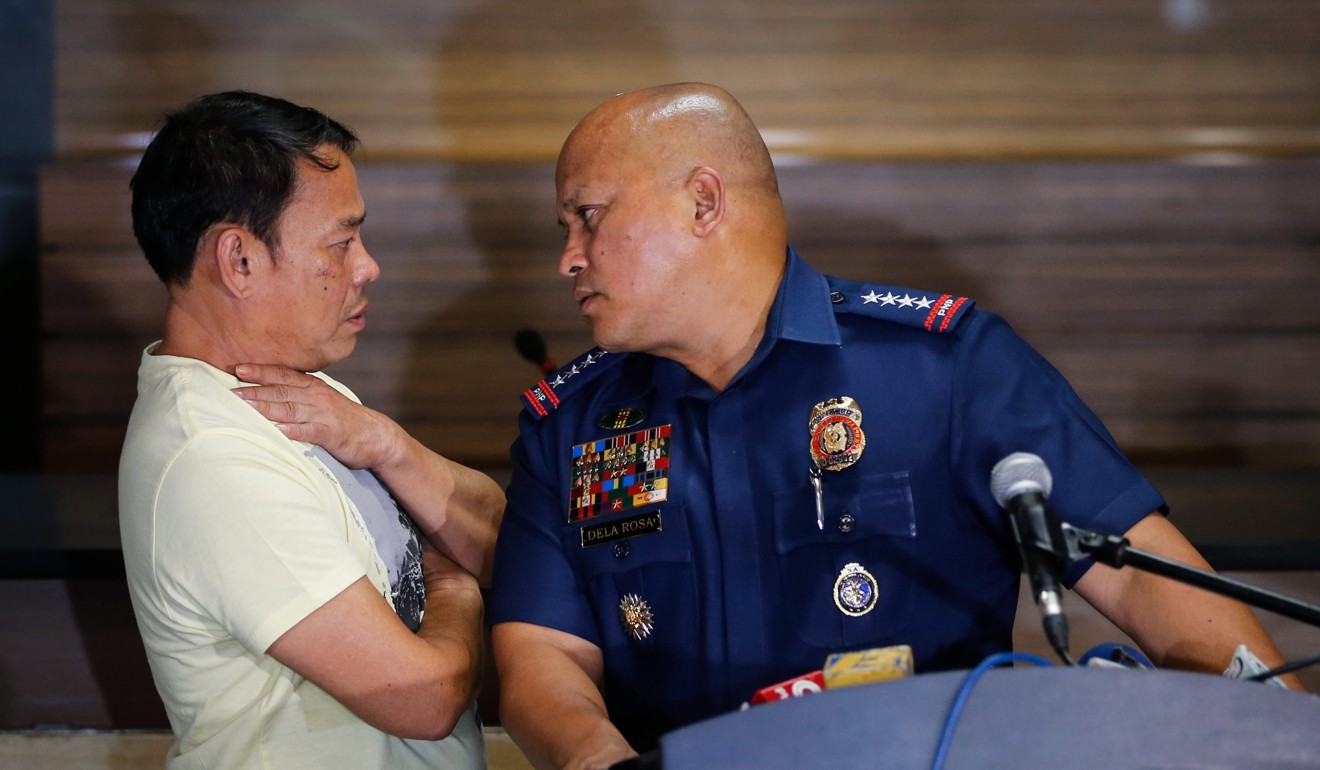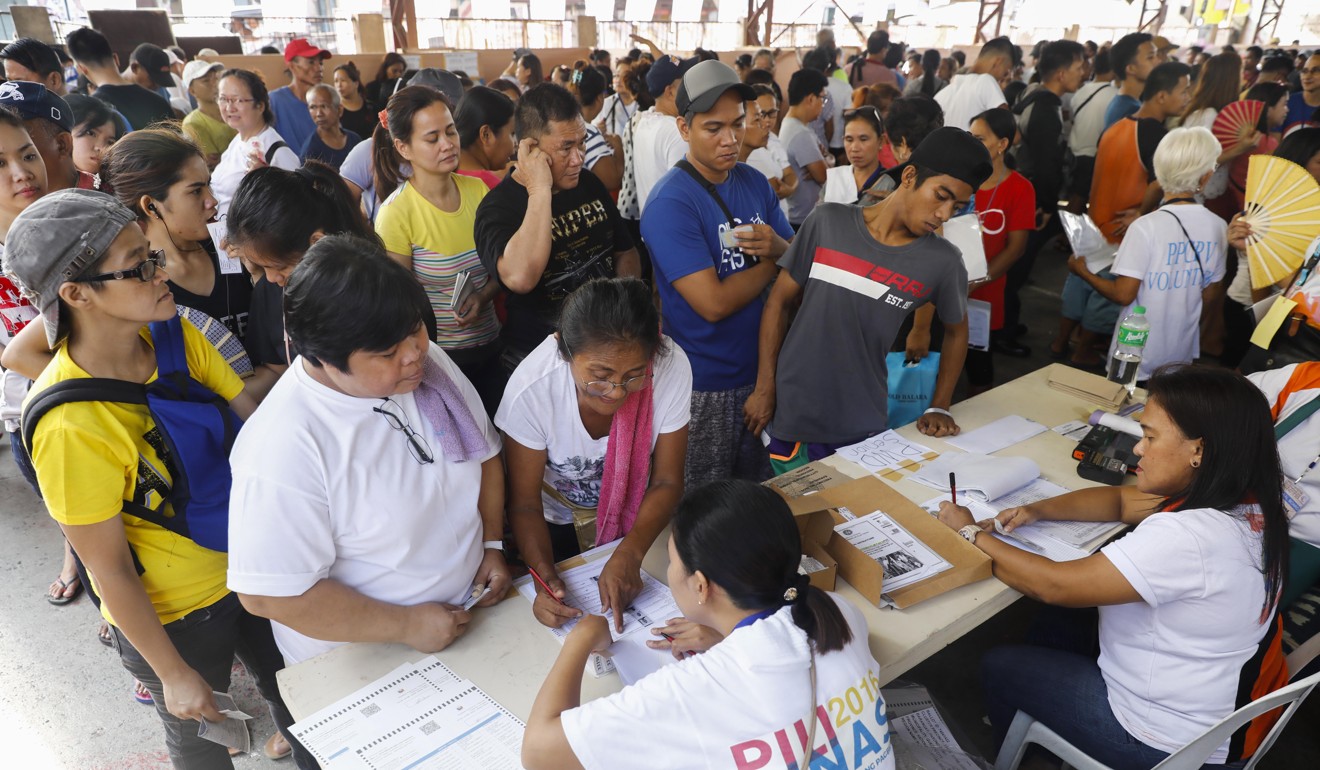
Philippine election: ‘Duterte’s magic routed opposition’
- Strong showing by the president’s allies in midterm elections paves the way for him to ‘transform political system’
- Proceedings are marred as vote counting machines across the country malfunction

Philippine President Rodrigo Duterte’s spokesman Salvador Panelo on Tuesday tried to play down fears that sweeping victories for Senate candidates allied to the strongman leader would lead to a rubber-stamp Congress.
“No Senate has ever been under any president. They always rise above partisan considerations when issues involve national interests, security, and the interests of the Filipino people,” said Panelo.
His statements came as the president’s ruling coalition was poised to dominate both chambers, especially the Senate. As of Tuesday night, only one opposition senator, Senator Paulo Benigno “Bam” Aquino IV, had a fighting chance of claiming one of the 12 Senate seats up for grabs.
Panelo credited the near rout to “the Duterte magic” and the Filipino yearning for “stability and continuity of the genuine reforms that the administration started. They yearn for a constructive – not obstructionist – Senate, which will help in crafting the president’s legislative agenda,” he said.
Critics of the Duterte administration, however, credited the performance to the millions of pesos that Duterte-backed candidates spent on advertising early last year.

Duterte loyalist Ronald “Bato” de la Rosa, who is assured of a Senate seat after gaining 18.3 million votes, said on ABS-CBN’s English news channel ANC: “I am supportive of [the presidential palace] but I will never be dictated [to by it]. My loyalty to the political party ends where my loyalty to the Filipino people begins.”
As the former Philippine National Police chief, he was the chief implementer of Duterte’s “war on drugs”. Yesterday, he said he would push for a law restoring the death penalty for drug traffickers.
The opposition Liberal Party has so far refused to concede defeat. As of 7pm last night, 95 per cent of all votes cast had been tallied, but more than two million votes remain uncounted.
Unofficial counts on Tuesday suggested allies of Duterte were clear winners in 10 of the 12 seats. An 11th seat was won by Senator Grace Poe, who ran without a party and came second overall with 21.4 million votes. The winner of the 12th seat is still not clear, but Bam Aquino IV has a chance of victory.
The nation voted on Monday to fill about 18,000 positions – primarily local positions but also half the seats in the 24-member Senate and nearly 300 seats in the lower House of Representatives.
The vote has been cast as a referendum on Duterte’s leadership, three years since he took office, and a strong showing by his preferred candidates is likely to embolden the president and cement his influence on the Senate, which has traditionally kept executive power in check. Duterte’s allies are also expected to dominate in the lower house.
Critics have hit out at Duterte’s brutal crackdown on drugs, extrajudicial killings and his courting of Beijing.

His supporters, however, say he has made the country safer and reduced crime. A recent poll recorded an 81 per cent approval rating.
“This election just gave Duterte carte blanche to push his brand of governance to its logical conclusion: complete transformation of the nation’s political system,” analyst Richard Heydarian said.
However, Duterte’s ambitions to scrap the present presidential system and create a federal form of government are still far from assured. Even if Duterte allies take 11 of the 12 seats, the president will still have to convince his daughter, Davao City Mayor Sara Duterte-Carpio, his finance secretary Carlos Dominguez and his economic planning secretary Ernesto Pernia to go along with the plan.
Mayor Sara categorically stated in April this year that she was “not for federalism” because it would give more power to local political warlords. She said: “I do not think it is right to give bigger powers when you have such a set-up.”
Meanwhile economic planning secretary Pernia warned last year that the version of federalism proposed by Duterte’s appointed Consultative Committee would cut into the budget for Duterte’s “Build, Build, Build” infrastructure programme because it would cost at least 120 billion pesos (US$2.2 billion) to set up and run.
Pernia even estimated that the required financing could raise the country’s fiscal deficit to 6 per cent of GDP, “wreak havoc” on our “fiscal situation” and cause a downgrade in the country’s ratings. Finance chief Domingo also cautioned against rushing into federalism, saying there was “potential for it to become a nightmare” if the tax-sharing schemes were not well ironed out.
Leading the pack in terms of Senate votes was billionaire Cynthia Villar, the co-leader of the Nacionalista Party (NP) allied with Duterte. Villar is eyeing a presidential run in 2022, a Senate source told the South China Morning Post. She got more than 24 million votes. Senator Grace Poe, who ran as an independent but is expected to be friendly towards the Duterte administration, got 21 million votes while the president’s former special assistant, Christopher “Bong” Go, had more than 19 million. Pia Cayetano, the sister of Duterte’s former foreign secretary Alan Peter Cayetano, was fourth with 19 million votes.

Others in line for a seat include Senator Edgardo Angara with more than 17 million votes, veteran actor and former Senator Lito Lapid with more than 16 million, former president Ferdinand Marco’s daughter Imee with more than 15 million, former Metro Manila Development Authority chair Francis Tolentino with just under 13 million, and ex-action star Bong Revilla, who was recently acquitted from a multibillion-dollar pork barrel scam, with 14 million.
Bam Aquino, 42, had more than 13 million votes.
A sitting senator and younger cousin of former President Benigno Aquino III, he has put an emphasis on educational and business reforms.
If he wins, he will join five incumbent members of the opposition Liberal Party: Senators Franklin Drilon, Risa Hontiveros, Francis Pangilinan, Joel Villanueva and the detained Senator Leila de Lima.
With only six Liberal Party members, a constitutional shift to federalism now becomes possible provided that Senator Grace Poe backs the shift.
Still, this means that proposed laws needing a simple majority vote are likely to pass, such as the restoration of the death penalty.
The opposition has warned constitutional change could lead to the single-term limit for the presidency being lifted, allowing Duterte to prolong his rule despite his repeated statements that he would stand down at the end of his mandate.
The polls saw isolated outbursts of violence, which is not unusual in the Philippines’ frequently bloody competition for elected seats.
At least 20 people were killed and 24 wounded in election-related violence in the run-up to the vote, according to an official count.

The military said nine people were shot and wounded on Monday during a confrontation at a polling station on the southern island of Jolo, which is home to insurgents and powerful local clans.
But turnout, while slow at the start, grew throughout the day as voters – including celebrities – showed photos of their purple ink-stained fingers on social media, urging others to vote.
A serious glitch in the Commission on Elections “transparency server” however resulted in delays to updates on the vote count by eight hours. The transparency server receives all digital copies of election returns and media outlets use it to provide readers with unofficial quick counts.
Asked to address concerns that the delay was due to efforts to rig the vote count, Comelec Commissioner Rowena Guanzon said a surge of data to the server had led to delays.
“It’s like the system was shocked because of the rush when the data packets all came in simultaneously,” she said. “All the [Comelec] directors needed to monitor the transparency server were present. And you will see there was no cheating. We had a central server and the central server was working perfectly.”
But malfunctions of vote counting machines were reported across the country, with reports of them turning off by themselves, valid ballots being rejected and failing to produce voting receipts. Guanzon said the Comelec would hold a briefing on Tuesday afternoon to explain what happened.
Vice-president Leni Robredo, of the opposition Liberal Party, cautioned supporters that “we still have to fight. The counting is not yet over and we still need to watch it closely”.
Duterte’s family members are expected to do well in the polls. The president’s daughter Sara, considered by some as his potential successor in the 2022 vote, looks set to remain as mayor in the family’s southern stronghold of Davao city.
Her younger brother Sebastian ran unopposed for the city’s vice-mayoral seat, while Duterte’s eldest son Paolo was on track for a seat in the House of Representatives, according to PPCRV, a Philippine elections NGO.
Additional reporting by Agence France-Presse